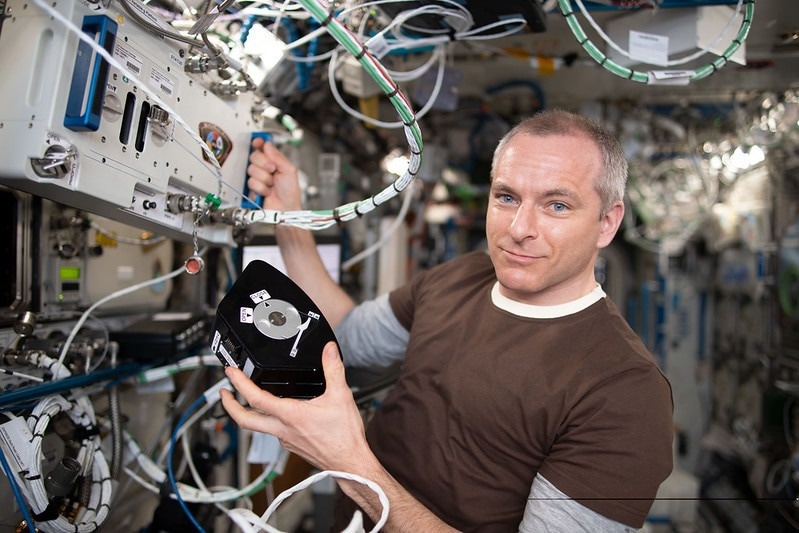More than 650 million people worldwide are affected by osteoarthritis, and few treatment options exist. However, new promising results from an International Space Station (ISS) National Laboratory-sponsored experiment detail a tissue chip model that accurately reproduces the conditions under which post-traumatic osteoarthritis (PTOA) is initiated. Published in Frontiers in Space in March, these findings mark an important step forward in understanding and testing treatments for the underlying causes of osteoarthritis and related conditions.
 Canadian Space Agency astronaut David Saint-Jacques processes samples for an ISS National Lab-sponsored experiment that studies the effects of spaceflight on musculoskeletal disease as part of efforts to develop drugs to prevent post-traumatic osteoarthritis. Image credit: NASA
Canadian Space Agency astronaut David Saint-Jacques processes samples for an ISS National Lab-sponsored experiment that studies the effects of spaceflight on musculoskeletal disease as part of efforts to develop drugs to prevent post-traumatic osteoarthritis. Image credit: NASA
In the latest issue of Upward, the official magazine of the ISS National Lab, study author Alan Grodzinsky, a biological engineering professor at the Massachusetts Institute of Technology (MIT), discusses experiments on the space station using his team's innovative tissue chip model. The model effectively replicated a joint environment with viable human cartilage, bone, and synovium cocultures, establishing a baseline for understanding and testing treatments for PTOA, which can occur after a traumatic injury to a joint and affects around 20 percent of the millions of people with osteoarthritis. Despite its prevalence, no U.S. Food and Drug Administration-approved drugs exist to treat or prevent osteoarthritis and related conditions.
Grodzinsky commented on the significance of these findings in Upward, stating, "This opens up new possibilities for testing drugs and interventions for osteoarthritis and other joint disorders. It could also aid in developing preventative treatments."
The space environment was essential to the experiment’s success, as it appeared to simulate osteoarthritis characteristics quicker than similar experiments on Earth, with past research demonstrating accelerated bone loss in microgravity. Key findings from the study show the tissue chip's capability to emulate the initiation and progression of PTOA and the effects of various treatment modalities. Notably, the device accurately simulated the impact of drugs commonly used to alleviate inflammation and pain in patients. Additionally, it showed potential for evaluating a drug designed to stimulate cartilage growth and repair, offering promising avenues for therapeutic intervention.
By providing a platform for precise and controlled experimentation, the tissue chip model offers researchers a powerful tool to explore the mechanisms underlying joint diseases and develop targeted therapeutic strategies, says Grodzinsky.
Source:
Journal reference:
Dwivedi, G., et al. (2024). Effects of dexamethasone and IGF-1 on post-traumatic osteoarthritis-like catabolic changes in a human cartilage-bone-synovium microphysiological system in space and ground control tissues on earth. Frontiers in Space Technologies. doi.org/10.3389/frspt.2024.1358412